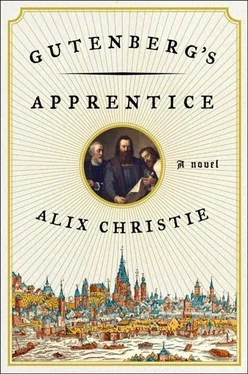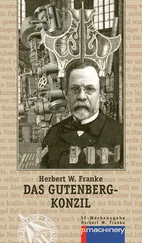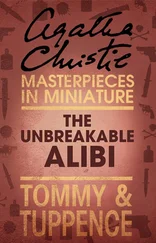It was strangely quiet as he stood there, tensing and untensing his long hands. Drays waiting for unloading stood before the Kaufhaus, the huge customs hall. Horses stamped, the starlings wheeled, yet over everything there hung a pall. His eyes went to the jerking clock hands on the tallest spire, the red cathedral of St. Martin’s. He waited until they stood in a straight line. They clicked, the mechanism cracking sharply in the silence. No bells. In all those forty churches, he could hear no bells. The archbishop’s ban was just another sharp reminder of who really held the reins, his father’s friends had said. The workingmen had won the city council and tried to halt the years of plunder by the ruling Elder clans. But when the council would not pay the interest that those clans demanded on the sweetheart deals they’d engineered, the old guard simply called in Archbishop Dietrich’s fist. It was the same old litany of greed, the grappling for power in this backwater that history had left behind. Peter turned and struck across the square toward the Haus zur Rosau.
His father’s house was not the grandest of all the timbered merchant homes that ringed the Brand. Yet it was imposing, like the man himself: broad and solid with an unexpected grace inside. Its floors were of blue slate, its yellow walls warmed by new tapestries from France and Flanders — though in the heat of this late summer these were rolled away, the window gaps all hung with gauze.
His foster father had the big man’s way of crushing those he loved against the ample shelf that was his stomach. And then he held Peter at arm’s length. “At last.” He smiled.
“You knew full well which boat I would be on.”
“Yet still I watched for every one.” Johann Fust had eyes as blue as Mary’s vestments in a face that with the years and success had reddened and filled. One eye winked.
“Then you’ll have noticed I come empty-handed.” Peter rolled his eyes.
“They stopped you then? At Speyer?”
“You might have warned me.”
His father squeezed his shoulder. “Nothing that a shilling in a palm won’t fix. What matters is that you’re home.” Fust turned as Grede stepped out into the hall. His father’s wife looked wan, but on her lips still played the wry smile she had always worn. “Wonder of wonders.” She turned her cheek to his. “I’d given up all hope you’d see your brother before he could hold a stylus.”
“I left the Palace of the Louvre in some despair.” He grinned and bowed, raking the floor with one limp hand. “To grace ye people in your humble homes.”
She laughed. And yet his father’s bright young bride — his second, and a kind of sister to Peter — appeared exhausted: as if, having survived once more the terror of the childbirth bed, she had at last left youth behind. She had not looked this way when she bore Christina five years before.
They went on to the big front room and stopped before a cradle. Fust took the bundle in his arms. “We call him Henchin. Little Hans,” he said with unmasked pride. The baby yawned, its face scrunched up like an old wizened apple. Its eyes flew open, blue as those that gazed in wonderment down on them. Peter put a finger to the tiny fist, and bent to kiss the tiny head. He’d never had a sister or a brother who shared his own blood; his mother died in bearing him. He’d been saved, adopted into this fine house, by her first cousin, Fust’s first wife. Gently he unwound the little clinging fingers. He’d grown to manhood in these walls. But this in no way meant he held a claim against this little red-faced chap — only because of his late arrival had Peter been welcomed years before into this house.
All through the meal that followed Peter watched his father, hoping for some sign. Grede had put out beeswax candles and her prized Venetian glass. The cook had made roast lamb, potatoes, chard, some fowl baked in a pie. They’d wash it down with Rheingau from St. Jakob’s vines. Peter had brought gifts: a calfskin workbook for Tina, five by now and as primped and blond as any cherub, and a baby’s beechwood game of catch-a-bob. The servants filed in silently as Fust stood, leafing with a frown through a worn pocket Bible. “A reading from Saint Matthew,” he said finally, and cleared his throat. “Whose birth we honor in these days.”
Peter caught Grede’s eye. Since when did Fust say blessings at the table? The ban , she mouthed back, nostrils flaring. Dietrich backed his own class, naturally; the lower orders might pretend to rule, but they would have to fall in line. There’d be no sacraments until the upstart council had backed down. The archbishop’s word was law: none of his priests would say a mass or take confession; the newly born were unbaptized and the dying were deprived of their last rites, consigned forever to the agony of limbo. Grede’s face was dark with anger.
You have heard that it hath been said, “An eye for an eye, and a tooth for a tooth.” But I say to you not to resist evil: but if one strike thee on thy right cheek, turn to him also the other; And if a man will contend with thee in judgment, and take away thy coat, let go thy cloak also unto him.
Fust looked up and fixed his elder son with shining eyes.
You have heard that it hath been said, “Thou shalt love your neighbor, and hate thine enemy.” But I say to you, Love your enemies: do good to them that hate you: and pray for them that persecute and calumniate you: That you may be the children of your Father who is in heaven, who maketh his sun to rise upon the good, and bad, and raineth upon the just and the unjust.
The assembled foreheads flickered in the candlelight. Fust bowed his large and white-fringed head. Had he chosen that passage just for him? Peter wondered. It wouldn’t be the first time. He tried and failed to catch Fust’s gaze. What message did his father mean to send? Acceptance of injustice, and the stilling of one’s own desires? Impatience flooded him as he stood waiting, willing Fust to make the meaning of this journey clear.
“Though we may chafe, let’s not forget the wisdom of the scriptures.” Fust signaled for the wine. “Nor, on this joyous day when Peter has returned, dwell overmuch on persecution. The fathers of the church were far more persecuted in their time.”
He smiled and raised his goblet to toast Peter. And Peter, chilled, raised his. How should he not? He owed Fust everything. He could not see into the merchant’s heart, yet he could guess what Fust saw every time he looked at Peter: the boy he’d raised, the life he’d forged, the skills and travels he’d unstintingly bestowed. The life of mud and dung from which he’d raised the grubby offspring of his first wife’s cousin. A line appeared in Peter’s mind, as fresh as if old Cicero had penned it just that instant: There is no more essential duty than returning kindness .
Words of guidance, penned in deep antiquity and carried forward through the long, dark centuries by Christian scribes.
“The feast of Saint Matthew is auspicious for all business ventures.” Fust’s teeth were gleaming in the torchlight. Peter waited, long legs stretched out from the willow chair. The heat of the day had left the air of the courtyard warm and scented by the rose, and from the lane beyond he smelled the tang of fruit, the thick hot earthiness of livestock. He heard the call of owls, the intermittent roar out of the gaming house — those old, familiar sounds.
“What do you mean?” he asked, when Fust did not continue.
“Just that I have a proposition.” His father sat upright.
Which I may not refuse. “And this is why you called me back.”
“We have a chance to shape the future.” Fust leaned forward, peering at him in the dusk. “You and I together, I mean.”
Читать дальше












